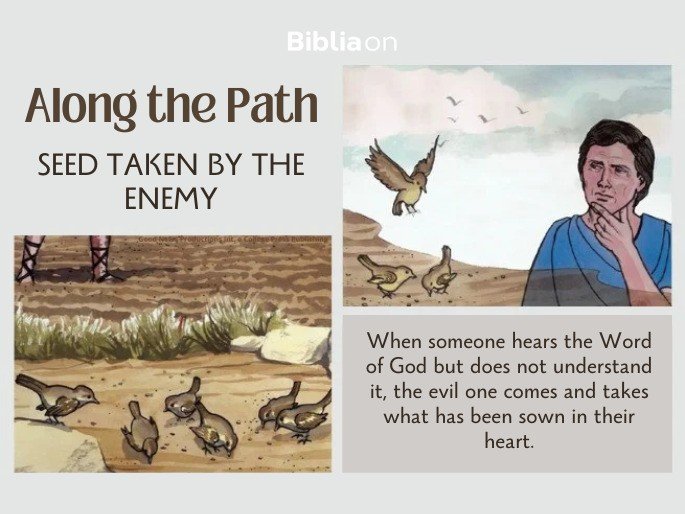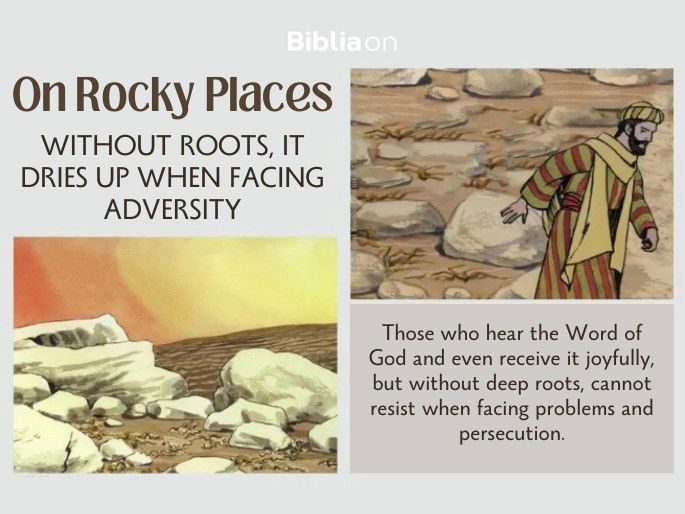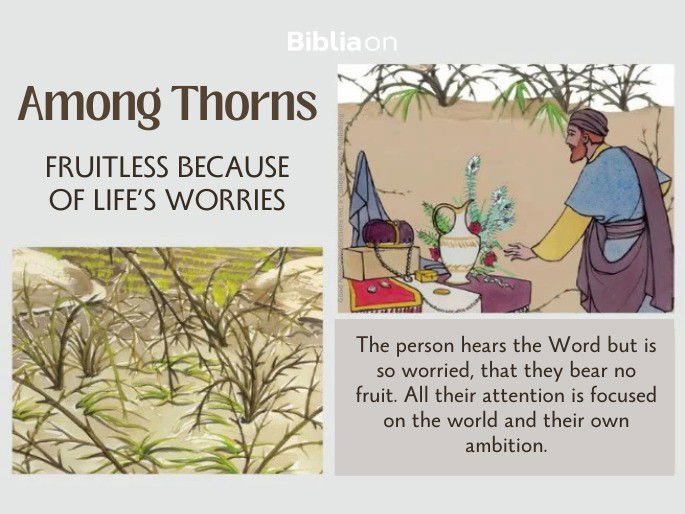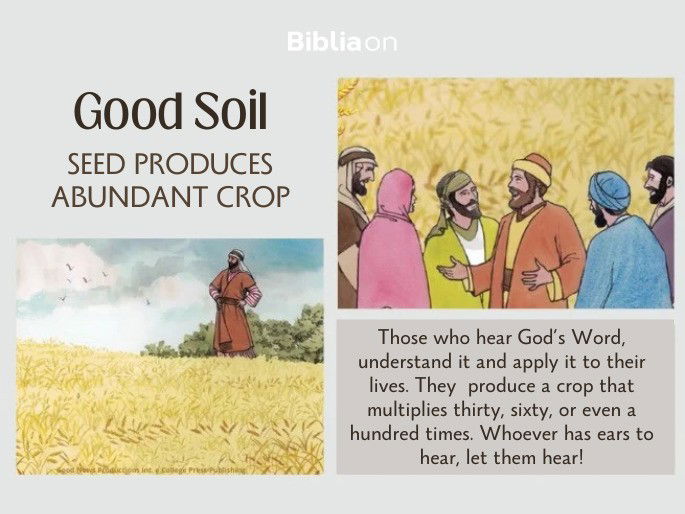Sometimes also known as The Parable of the Seeds, The Parable of the Sower is a story taught by Jesus to illustrate the different ways in which the Gospel is received in people's lives. It is recorded in the Gospels of Matthew 13:1-23, Mark 4:1-20, and Luke 8:5-15, where Jesus also provided a clear explanation of its meaning.
The Parable of the Sower
Again Jesus began to teach by the lake. The crowd that gathered around him was so large that he got into a boat and sat in it out on the lake, while all the people were along the shore at the water’s edge. 2 He taught them many things by parables, and in his teaching said: 3 “Listen! A farmer went out to sow his seed. 4 As he was scattering the seed, some fell along the path, and the birds came and ate it up. 5 Some fell on rocky places, where it did not have much soil. It sprang up quickly, because the soil was shallow. 6 But when the sun came up, the plants were scorched, and they withered because they had no root. 7 Other seed fell among thorns, which grew up and choked the plants, so that they did not bear grain. 8 Still other seed fell on good soil. It came up, grew and produced a crop, some multiplying thirty, some sixty, some a hundred times.”
9 Then Jesus said, “Whoever has ears to hear, let them hear.”
10 When he was alone, the Twelve and the others around him asked him about the parables. 11 He told them, “The secret of the kingdom of God has been given to you. But to those on the outside everything is said in parables 12 so that,
“‘they may be ever seeing but never perceiving,
and ever hearing but never understanding;
otherwise they might turn and be forgiven!’”13 Then Jesus said to them, “Don’t you understand this parable? How then will you understand any parable? 14 The farmer sows the word. 15 Some people are like seed along the path, where the word is sown. As soon as they hear it, Satan comes and takes away the word that was sown in them.16 Others, like seed sown on rocky places, hear the word and at once receive it with joy. 17 But since they have no root, they last only a short time. When trouble or persecution comes because of the word, they quickly fall away. 18 Still others, like seed sown among thorns, hear the word; 19 but the worries of this life, the deceitfulness of wealth and the desires for other things come in and choke the word, making it unfruitful.20 Others, like seed sown on good soil, hear the word, accept it, and produce a crop - some thirty, some sixty, some a hundred times what was sown.”
Mark 4:1-20
Explanation of the Parable of the Sower
Jesus told this illustration of seeds being sown on different types of soil to explain the different types of responses people give when they hear the Word of God. Primarily, it calls our attention to what kind of response we give to the Gospel.
In this story, practical examples from everyday life carry a clear meaning in the Kingdom of God:
- The seed is the Word of God, the Gospel in the person of Jesus himself, who is the living Word.
- The sower is the one who proclaims the Word of God.
- 4 types of soil are the different types of people and their reactions to the seed.
- Each type of soil determines what happens to the seed itself.
- The Path - are people who hear, but do not believe, have a hard heart, unreceptive to the Word of God.
- The birds that eat the seed are a symbol of Satan who comes and takes the Word away from them so that they are not saved.
- Rocky Places - are shallow people, emotional listeners, but with internal obstacles that prevent the Gospel from taking deep roots.
- The heat of the sun - problems, trials, intolerance, or rejection because of faith in Christ that make some people falter.
- Thorny soil - are people who heard, but as the days go by, they are choked by the concerns of this world and the pleasures of life. These have greedy and selfish inclinations, and do not bear fruit, because they live to satisfy their interests.
- The thorns are earthly riches, and anything that arouses ungodly ambition, greed, and passion, in short, it is love for everything that is not God.
- Good soil - are people who hear the Word of God and receive it with faith, with an honest and upright heart they bear fruit, even if they have to face difficulties in life.
- Crops of 30, 60, or 100 fold - are the many fruits produced through the good seed received by faith in the hearts.
The Parable of the Sower teaches us that the seeds were cast on different types of soil. The Bible has been proclaimed to different people all over the world. Everyone who has heard the Gospel of Jesus Christ assumes a stance regarding the good seed. Therefore, it is worth reflecting on who we are in this illustration:
1. The Path
Jesus was referring to people who hear the Gospel and reject it, oppose it, or simply do not understand what is central to faith in Him. Unfortunately, in this case, the seed does not even germinate in the soil, as it does not find a place in the heart of the listener.

In this first type, the hard soil firm in itself prevents the seed from germinating. This soil, paved like a consistent path, receives many travelers from one side to the other but does not open up to receive the good seed to sprout. The seed is trampled or eaten by birds.
Similarly, the hardness of the listener's heart prevents the Word of God from entering and transforming their life. It remains so superficially in the realm of ideas that soon the Devil comes and takes it away from their mind.
2. Rocky Places
Some people hear the Word of God with sympathy and even seem receptive to the message of faith in Jesus Christ. But when they face difficulties, they quickly abandon their faith. They are superficial and show satisfaction in hearing the Gospel and the good things that come from God, but when problems arise, they give up. The hot sun of struggles, due to a lack of faith, dries up their sprouts because they do not have strong roots.

This illustration teaches us that emotion is not enough to make the Word of God germinate in us. It is necessary to have true faith in Jesus Christ. It is necessary to make room for Him; we must completely surrender our lives, and open up space for Him to grow and transform our hearts.
The rocks here are the metaphorical hindrances we use to avoid fully receiving Jesus. They are small stones that become our treasures, idols (even ourselves!), false teachings, trivial philosophies, and many other things that occupy our lives, competing with the Truth of Christ; they are heaps of things we carry that we consider more important than the Gospel.
3. Thorny soil
This soil is divided between the good seed and the thorns of weeds around. There is not a total commitment to the received Word. The person hears God's message but pays more attention to selfish interests and temporary passions, not allowing His message to grow. The seed tries to develop but is suffocated by the thorns of worldly concerns.

Similar to the previous one, this type of soil is also not favorable for the seed to grow. If in rocky soil there are too many stones that prevent the root from deepening, in this case, there are external problems that prevent it from bearing fruit.
The thorns are the many concerns and ambitions of this life, which prevent the Gospel from producing good fruit. The Word never reaches its potential or transforms these lives, as it is stifled by other voices of the world.
4. Good soil
Finally, there is a type of soil where the good seed is well received. These are hearts where the Word of God is welcomed with love and faith. In these people, the Gospel is well incorporated, it can grow and produce many fruits. Those who hear the Word and understand it by faith are people who bear fruit in great quantity, for they multiply the received seed, communicating the message of Christ to others.

The Word of God fills their lives so much that it spreads to others around them, spreading the good seed. But the credit for this healthy crop does not go to the soil, the seed, or even the sower... it is God who makes the crops grow, he is responsible as the source of all life. Once we have received Jesus in our lives God will also make us fruitful.
What kind of soil are you today? If you have already heard and understood the message of salvation in Jesus Christ, make a real commitment to Him. Your life will be entirely for God, and thus you will be able to see the fruits of the work of the Lord Jesus, He who died as a grain in the earth (John 12:24), giving life to those who believe.
The message of God, who out of love sent Jesus into the world to give life (John 3:16), must produce many fruits in us and through us, for the glory of the Lord.
Learn what the Bible says about 'Do not Conform to the Pattern of this World: Romans 12:2 (Bible Study)'
Interested in reading more parables? Discover the Best-Known Parables of Jesus And What They Are All About
